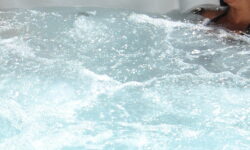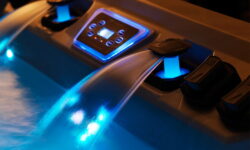You’re puzzled about using vinegar in your hot tub, aren’t you? You’ve heard it can work wonders, but how? This article will dive into the chemistry of vinegar and its effects on your hot tub.
Vinegar can be used as a natural cleaning agent for a hot tub. It’s especially effective for removing mineral buildup and other residues that may accumulate over time. However, care must be taken not to use too much vinegar as it’s acidic and can potentially damage the tub’s material and upset the pH balance of the water. Regular use of vinegar can also cause corrosion to the heater element and pump seals.
We’ll weigh up the pros and cons, guide you through the cleaning process, and explore alternatives. Let’s unlock the mystery behind this household item’s role in hot tub maintenance. You’ll soon be an expert on the vinegar-hot tub connection!
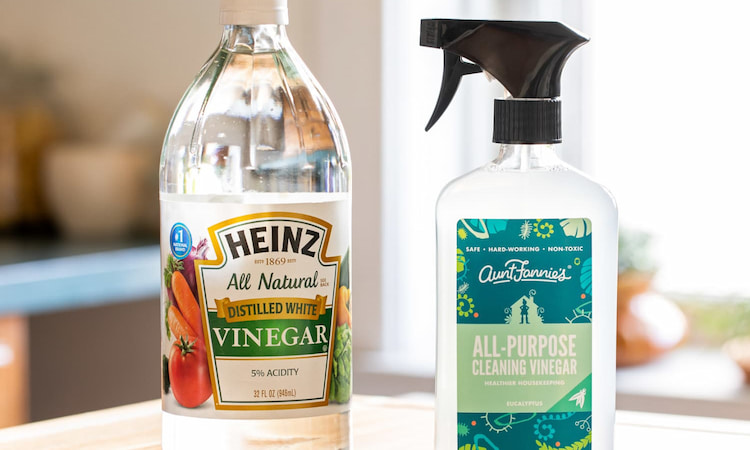
Quick Navigation
Understanding the Chemistry of Vinegar in Hot Tubs
Before you can fully appreciate what vinegar does to a hot tub, it’s crucial that you understand the underlying chemistry involved. Vinegar, primarily composed of acetic acid, exhibits a characteristic acidic pH level that typically falls between 2.4 and 3.4. This pH level denotes its potential to donate protons or hydrogen ions in a solution, a property intrinsic to all acids.
It’s important to note that vinegar’s pH level, due to its acidity, can have a corrosive impact on your hot tub’s components. This corrosive effect is exacerbated by the heat of the water, which accelerates chemical reactions. Metals such as steel, iron, and copper, commonly found in pumps and heaters, are particularly susceptible to this corrosion.
Now, you may wonder, why would you consider using vinegar in your hot tub if it has a corrosive impact. The answer lies in vinegar’s efficacy as a cleaning agent. Its acidic nature makes it adept at breaking down mineral deposits, grime, and biofilm that often accumulate in the plumbing of hot tubs. However, proper rinsing post-cleaning is vital to mitigate any potential corrosive effects.
Evaluating the Pros and Cons of Using Vinegar
You often weigh the pros and cons when making decisions, and deciding whether to use vinegar in your hot tub is no different. This decision requires a detailed understanding of the pros and cons of using vinegar, including a vinegar types comparison and vinegar’s environmental impact.
Pros of Using Vinegar in Hot Tubs:
- Affordable and accessible: Vinegar is a cost-effective solution for hot tub maintenance.
- Environmentally friendly: Vinegar doesn’t contribute to chemical runoff, reducing your environmental impact.
- Versatile: Different types of vinegar, such as white or apple cider, can be used depending on your specific needs.
Cons of Using Vinegar in Hot Tubs:
- Time-consuming: Vinegar requires more time to clean and decontaminate your hot tub compared to other cleaning agents.
- Inefficient: Vinegar may not be as effective at removing certain types of algae and bacteria.
- Potential damage: Overuse of vinegar can potentially damage the pH balance and materials of your hot tub.
Understanding these points can assist you in making an informed decision on whether vinegar is the appropriate choice for your hot tub cleaning needs.
Practical Steps to Clean Your Hot Tub With Vinegar
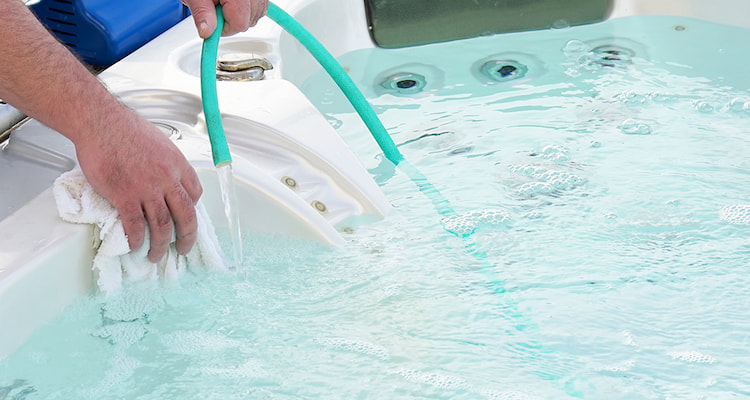
Once you’ve weighed up the pros and cons, and decided to give vinegar a try, start off by draining your hot tub, and then fill it up with water and vinegar in a 2:1 ratio. This Vinegar Dilution Ratio is crucial for the effectiveness of the cleaning process. Too much vinegar could potentially damage the tub’s aesthetic, while too little may not effectively clean the tub.
Next, turn on your hot tub to allow the vinegar solution to circulate. Let it run for around 2-3 hours to thoroughly cleanse the pipes and jets. This step helps in removing the stubborn buildup of biofilm, a common issue in hot tubs.
Once done, drain the vinegar solution from the tub. It’s essential to rinse it thoroughly with fresh water to remove any traces of vinegar. A lingering vinegar smell could be unpleasant and might also affect the pH balance of your tub water when refilled.
Lastly, for tub aesthetic preservation, wipe the tub dry with a soft cloth to prevent water spots and streaks. Regular maintenance with a vinegar solution can help keep your hot tub pristine and hygienic, enhancing your hot tub experience.
Related Read: How to Clean a Hot Tub Filter with Vinegar?
Alternatives to Vinegar for Hot Tub Maintenance
While vinegar’s natural cleaning properties can be handy for hot tub maintenance, there are several other effective alternatives you might want to consider. If you’re looking for a chemical-free maintenance routine, there are a few natural cleaners usage you can explore.
- Baking Soda: This natural cleaner is a great alternative to vinegar. It’s excellent for scrubbing away grime and balancing the pH level of your hot tub water.
- Borax: This mineral compound is another fantastic alternative. It’s useful for adjusting the pH in your hot tub, and it’s a lot gentler on your skin than chemical cleaners.
- Lemon Juice: This citrus fruit not only cleans but also leaves a pleasant aroma. It’s effective in removing grease and oils that accumulate in your hot tub.
Personal Experiences: Hot Tub Owners’ Tales of Using Vinegar
After hearing all about vinegar’s role in hot tub maintenance, isn’t it intriguing to dive into a collection of tales from hot tub owners who’ve tried this method over the years? They’ve shared their experiences with varying results, providing a real-world perspective on vinegar usage.
Hot tub owner Dan speaks about the vinegar aftermath, stating the initial results were impressive with the vinegar effectively cleaning the tub’s surface. However, he noticed that over time, vinegar seemed to degrade his tub’s rubber seals, leading to leaks.
Another owner, Lisa, shares her unusual encounters with vinegar usage. Initially skeptical, she was pleased to find that vinegar successfully eliminated the moldy smell that previously haunted her tub. Yet, she found the vinegar’s own scent lingered longer than expected, proving somewhat overpowering during her soak times.
Robert, a long-term hot tub owner, swears by vinegar. He uses an apple cider vinegar solution to manage the tub’s pH levels, boasting of its effective balancing act. But he warns that one must be diligent about rinsing, as vinegar residue can cause skin irritation.
These tales highlight that using vinegar in hot tubs can have mixed results. It’s crucial to consider these experiences when deciding if vinegar is right for your hot tub maintenance.
Frequently Asked Questions
You should use vinegar to clean your hot tub every three months. Adjust the vinegar concentration based on the tub’s condition. Remember, too much vinegar can affect the tub’s pH balance negatively.
Vinegar doesn’t affect your hot tub’s water temperature. However, its acidity can cause reactions with tub materials, potentially leading to degradation. It’s crucial to use it sparingly and monitor your tub’s condition regularly.
Yes, you can use vinegar to clean your hot tub’s outer shell or cover. Maintain a vinegar dilution ratio of 1:1 for effective cleaning. It’s environmentally friendly and won’t harm the tub’s material.
You don’t need a specific vinegar type for hot tub cleaning. White distilled vinegar generally works best. However, vinegar alternatives like citric acid and other natural cleaners can also be effective in maintaining cleanliness.
Vinegar in a hot tub can potentially cause health issues. You might experience vinegar allergies, leading to respiratory issues. It can also cause skin irritations, especially if you’ve sensitive skin or pre-existing skin conditions.
Conclusion
In conclusion, vinegar can be a cost-effective, natural cleaning solution for your hot tub. It helps to balance pH levels, remove mineral deposits, and sanitize your tub. However, it’s not without drawbacks, including the potential for damage to certain materials if not properly diluted.
The decision to use vinegar will depend on your specific needs and circumstances. Explore other cleaning alternatives and consult with other hot tub owners to make an informed choice.


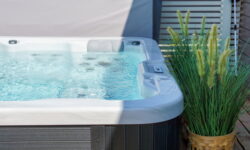
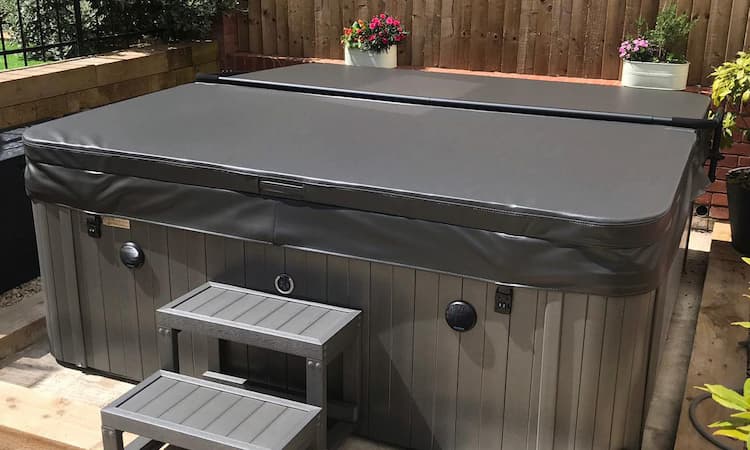
![Is Yellow Hot Tub Water Safe? [& Treatment Options] is yellow water in hot tub safe](https://hottubtales.com/wp-content/uploads/2023/10/is-yellow-water-in-hot-tub-safe-250x150.jpg)
